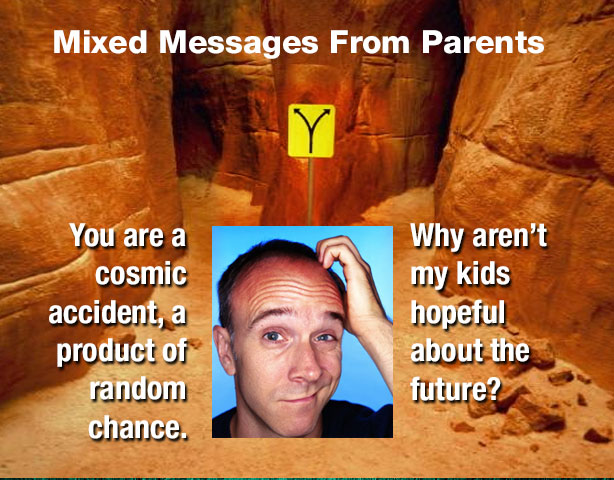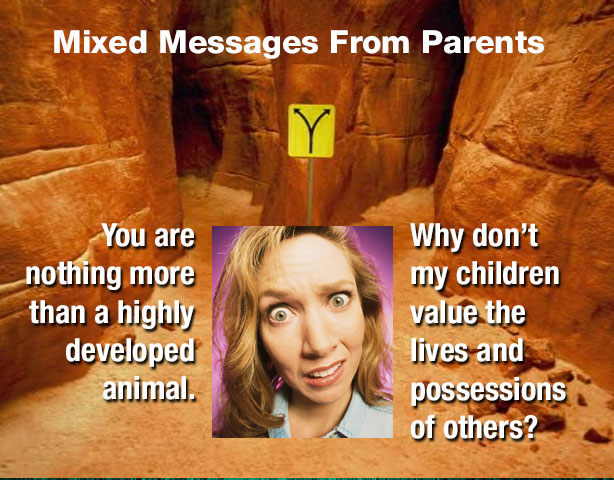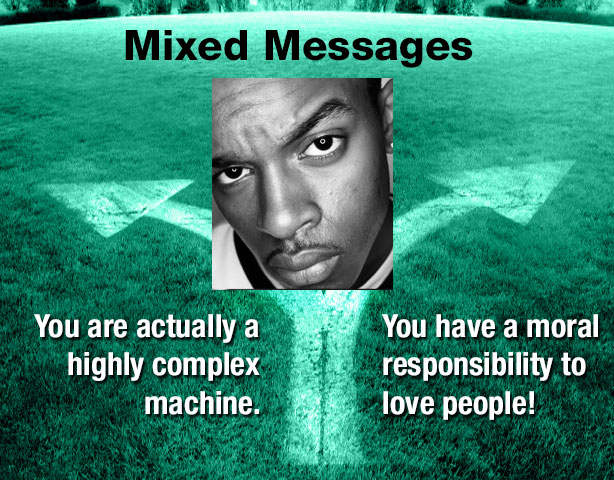
MENU

Is Evolution Really All That Important?
In the last 100 years macroevolutionary thinking has affected the very foundation of modern society. In every case, its effect has been negative, leading to errors in understanding and action. The most obvious negative impact resulted from the support that Darwin’s ideas provided for two of the greatest blights on humanity of all time—Communism and Nazism. Darwinian evolution provided the “intellectual sanction” for the revolutionary agendas of both Marx and Hitler.1 Although Darwin declined the offer, Marx actually wanted to show his appreciation to Darwin by dedicating Das Kapital to him!2 Michael Denton says, “The Darwinian view of nature more than any other is responsible for the agnostic and skeptical outlook of the twentieth century.”3
But Evolutionary thinking takes a personal toll as well. David Moore explains the impact of Darwinian evolutionary thinking on personal morality and identity:
Evolutionary thought has greased the way for the rapid degeneration of society. The foundation of every absolute value and standard has been destroyed and replaced by the philosophical (not scientific) foundation of evolution. For example, why should people accept responsibility for their actions if they truly have no freedom of choice? Why should anyone respond with moral responsibility toward one’s fellowman if we are highly complex machines governed by survival of the fittest? How do we expect our children to develop a healthy self-concept when we teach them that they are an accident of random chance? The acceptance of evolution as fact has cut the heart out of humanity. . . .4


Evolutionary ideas have robbed people of a proper perspective for human understanding and have confused them regarding the meaning and purpose of life.


In reality, every human being possesses a basic understanding of the existence of God, though many are fighting hard to suppress it. Thomas Nagel, professor of philosophy at New York University, says it very plainly:
. . . I wanted atheism to be true and am made uneasy by the fact that some of the most intelligent and well-informed people I know are religious believers. It isn’t just that I don’t believe in God and naturally, hope there is no God! I don’t want there to be a God; I don’t want the universe to be like that.5
Apologetics scholar Ravi Zacharias cautions that skeptics who are less candid than Dr. Nagel may be hiding a similar attitude:
While Bertrand Russell’s skepticism may be represented as the honest search of reason, we had better be sure that it is not actually the wanton unbelief of Thomas Nagel that lurks beneath that intellectual quest. That kind of skepticism is the distortion of reason, masquerading as candor. To such a disposition, nothing would serve as sufficient evidence.6
Thousands of years ago, God exposed this kind of irrational thinking when He inspired the Apostle Paul to explain it to the Christians in Rome:
The wrath of God is being revealed from heaven against all the godlessness and wickedness of men who suppress the truth by their wickedness, since what may be known about God is plain to them, because God has made it plain to them. For since the creation of the world God’s invisible qualities—his eternal power and divine nature—have been clearly seen, being understood from what has been made, so that men are without excuse. For although they knew God, they neither glorified him as God nor gave thanks to him, but their thinking became futile and their foolish hearts were darkened . . . They exchanged the truth of God for a lie, and worshiped and served created things rather than the Creator—who is forever praised. Amen.7 (emphasis added)
When a person’s conscience tells him one thing, but everyone else is saying something different, most people don’t want to fight the tide of public opinion. Before long, the truth is replaced by the lie (in this case Darwinian evolution), and the ability to reason becomes distorted. Therefore, people need to hear the truth—the truth that their conscience was right all along! And for people who know the truth, they need to be prepared, as the Apostle Peter explained:
Always be prepared to give an answer to everyone who asks you to give the reason for the hope that you have. But do this with gentleness and respect . . . .8 (emphasis added)
INTRODUCTION
IRRATIONAL FANATIC?
IS EVOLUTION IMPORTANT?
WHAT IS EVOLUTION?
EVIDENCE FOR EVOLUTION?

Karl Marx so loved Charles Darwin's ideas on evolution that he wanted to dedicate Das Kapital to Darwin. Das Kapital is the foundational theoretical text in communist philosophy, economics and politics.

If the pieces don't fit together for you, how do you expect your children to deal with it?
- Michael Denton as quoted in Hank Hanegraaff, The Face That Demonstrates the Farce of Evolution (Nashville, TN: Word Publishing, 1998), p. 18.
- Theodosius Dobzhansky, “Evolution at Work,” Science, Vol. 127, May 9, 1958, p. 1091, as quoted in John C. Whitcomb and Henry M. Morris, The Genesis Flood (Phillipsburg, NJ: Presbyterian and Reformed Publishing Co., 1961), p. 444.
- Michael Denton as quoted in Hanegraaff, p. 18.
- David T. Moore, Five Lies of the Century (Wheaton, IL: Tyndale House Publishers, Inc., 1995), pp. 105-106.
- Thomas Nagel, The Last Word (New York: Oxford University Press, 1997), p. 130, as quoted in Ravi Zacharias, Jesus Among Other Gods (Nashville, TN: Word Publishing, 2000), p. 50.
- Zacharias, p. 50.
- Romans 1:18-25, NIV.
- 1 Peter 3:15, NIV
>
Design, graphics and artwork copyright © 2016 Tim Beasley • All rights reserved.